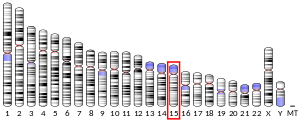Ornithine decarboxylase antizyme 2 is an enzyme that in humans is encoded by the OAZ2 gene.[5][6][7]
Ornithine decarboxylase catalyzes the conversion of ornithine to putrescine in the first and apparently rate-limiting step in polyamine biosynthesis. The ornithine decarboxylase antizymes play a role in the regulation of polyamine synthesis by binding to and inhibiting ornithine decarboxylase. Antizyme expression is auto-regulated by polyamine-enhanced translational frameshifting. The antizyme encoded by this gene inhibits ornithine decarboxylase but does not accelerate its degradation.[7]
References
edit- ^ a b c GRCh38: Ensembl release 89: ENSG00000180304 – Ensembl, May 2017
- ^ a b c GRCm38: Ensembl release 89: ENSMUSG00000040652 – Ensembl, May 2017
- ^ "Human PubMed Reference:". National Center for Biotechnology Information, U.S. National Library of Medicine.
- ^ "Mouse PubMed Reference:". National Center for Biotechnology Information, U.S. National Library of Medicine.
- ^ Ivanov IP, Gesteland RF, Atkins JF (Dec 1998). "A second mammalian antizyme: conservation of programmed ribosomal frameshifting". Genomics. 52 (2): 119–29. doi:10.1006/geno.1998.5434. PMID 9782076.
- ^ Zhou J, Atkins JF, Gesteland RF (Jul 1999). "Structure of human ornithine decarboxylase antizyme 2 gene". Gene. 232 (2): 165–71. doi:10.1016/S0378-1119(99)00128-6. PMID 10352227.
- ^ a b "Entrez Gene: OAZ2 ornithine decarboxylase antizyme 2".
Further reading
edit- Coffino P (2000). "Polyamines in spermiogenesis: not now, darling". Proc. Natl. Acad. Sci. U.S.A. 97 (9): 4421–3. Bibcode:2000PNAS...97.4421C. doi:10.1073/pnas.97.9.4421. PMC 34313. PMID 10781034.
- Ewing RM, Chu P, Elisma F, et al. (2007). "Large-scale mapping of human protein-protein interactions by mass spectrometry". Mol. Syst. Biol. 3 (1): 89. doi:10.1038/msb4100134. PMC 1847948. PMID 17353931.
- Mangold U, Leberer E (2005). "Regulation of all members of the antizyme family by antizyme inhibitor". Biochem. J. 385 (Pt 1): 21–8. doi:10.1042/BJ20040547. PMC 1134669. PMID 15355308.
- Strausberg RL, Feingold EA, Grouse LH, et al. (2003). "Generation and initial analysis of more than 15,000 full-length human and mouse cDNA sequences". Proc. Natl. Acad. Sci. U.S.A. 99 (26): 16899–903. Bibcode:2002PNAS...9916899M. doi:10.1073/pnas.242603899. PMC 139241. PMID 12477932.
- Chen H, MacDonald A, Coffino P (2003). "Structural elements of antizymes 1 and 2 are required for proteasomal degradation of ornithine decarboxylase". J. Biol. Chem. 277 (48): 45957–61. doi:10.1074/jbc.M206799200. PMID 12359729.
- Nilsson J, Koskiniemi S, Persson K, et al. (1998). "Polyamines regulate both transcription and translation of the gene encoding ornithine decarboxylase antizyme in mouse". Eur. J. Biochem. 250 (2): 223–31. doi:10.1111/j.1432-1033.1997.0223a.x. PMID 9428668.
- Bonaldo MF, Lennon G, Soares MB (1997). "Normalization and subtraction: two approaches to facilitate gene discovery". Genome Res. 6 (9): 791–806. doi:10.1101/gr.6.9.791. PMID 8889548.





